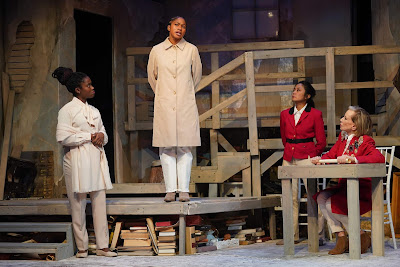When New York theatre shut down in 2020, I had to come up with a list of the top shows I missed due to the pandemic.
Since then, theatre has come back... very slowly. Each year I've hoped that the next year would be better, but sadly theatre in New York--and in the United States in general--is in a sorry state, less diverse, less original, and less interesting than it has been in a long time.
That doesn't mean there haven't been any good shows this year, and I've been fortunate enough to see a few of them. (Though some of the best plays I saw, including Mrs. Warren's Profession and Fable, were far from New York.) Here's my list of the top productions that opened in New York City in 2024:
10. The Heart of Rock and Roll - Yes, jukebox musicals are way overdone, but this delightful romantic comedy featuring the songs of Huey Lewis and the News won me over, in part due to the comic acting of McKenzie Kurtz.
9. Stereophonic - Even when it was Off-Broadway, Stereophonic was getting incredible buzz, much of it deserved. It's true that if you're not a Fleetwood Mac fan you won't be able to appreciate it as much of some of your neighbors in the theatre, but it's still worth seeing.
8. The Hills of California - Similar to Stereophonic in theme and scope but more ambitious in terms of its use of theatricality, Jez Butterworth's The Hills of California was a must-see play for me. Though not as successful as some of his previous work, it still packs an emotional punch.
7. A Wonderful World - I went into this bio-musical about Louis Armstrong somewhat skeptical, but I was pleasantly surprised to see how deftly the show treated its subject, one of the transformational geniuses of popular music in the 20th century. Also, having Tony-Award-winner James Monroe Iglehart play Armstrong didn't hurt.
6. Blood of the Lamb - If this Off-Broadway drama wasn't on your radar, it should have been. Arlene Hutton's eerily prophetic play about the human costs of increased legislation over women's bodies took medical and legal discussions beyond abortion to the multitude of cases that arise when pregnancies, wanted or not, go differently than planned.
5. Cabaret - Speaking of politics, this year's revival of the John Kander and Fred Ebb classic Cabaret felt more relevant than ever, not so much due to tinkering with Joe Masteroff's book as from a fresh interpretation by director Rebecca Frecknall. The immersive nature of the performance brought in a lot of press, as did some star actors, but the highlight of the show is Bebe Neuwirth's portrayal of Fräulein Schneider.
4. The Devil's Disciple - Bernard Shaw's comedic melodrama about the American Revolution is one of my favorite plays, but its large, mostly male cast makes it tricky to get staged. Director David Staller came up with an intriguing solution in adapting the play for a cast of five women. Oddly enough, it worked, in part due to an amazing ensemble led by Folami Williams. With a run straddling a controversial presidential election, this production gave audiences plenty of food for thought.
3. Suffs - If anything, Shaina Taub's musical about the women's suffrage movement was a bit too politically relevant this election year. It can be infuriating to watch a group of well-meaning activists fight one another rather than join forces to achieve something, but that's exactly what happened at the beginning of the 20th century, just as it happens all-too-often today. Taub's catchy songwriting provided the perfect medium to tell the complex story of how the 19th amendment was finally passed. Sadly, the show is now closing.
2. La Forza del Destino - If you missed the Metropolitan Opera's production of Giuseppi Verdi's rarely performed La Forza del Destino, you might have a while to wait for another chance. The opera has been said to be cursed ever since the baritone Leonard Warren died on stage during the show while singing at the Met in 1960. This year's production was instead blessed by amazing performances by Lise Davidsen as Leonora and Judit Kutasi as Preziosilla. If the Met announces the opera's return in its next season, definitely try to go.
1. The Great Gatsby - Though it was snubbed by the Tony Awards this year, the best show I saw in New York in 2024 was Kait Kerrigan, Nathan Tysen, and Jason Howland's new musical adaptation of The Great Gatsby. The lyrics are delightful, and the elaborate sets and musical numbers are impressive. Jeremy Jordan, Eva Noblezada, Noah J. Ricketts, and Samantha Pauly all give strong performances, but the real star of the show is F. Scott Fitzgerald's story, which is presented in a manner that is both faithful to the original novel and still relevant to audiences today.
Sadly, there weren't a lot of runners-up this year, but these shows prove it's still possible to make great theatre in New York.


